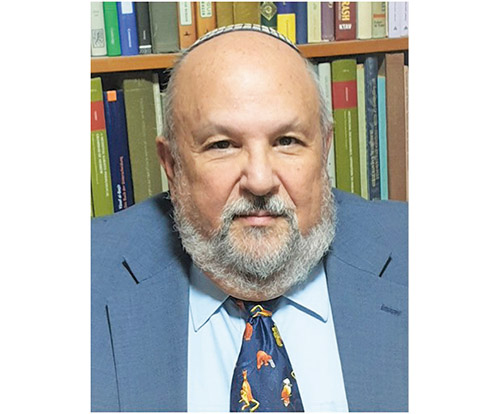
On Motzei Shabbat, March 4 at 8:30 p.m., Rinat Yisrael will host visiting Yale Professor Dr. Daniel Lasker, to discuss his latest book, “Karaism: An Introduction to the Oldest Surviving Alternative Judaism,” which has received international acclaim and was a finalist for the National Jewish Book Award in the category of scholarship for 2023.
Karaism, Lasker explains, which developed in the Middle East in the 9th century and has survived the last 1,200-1,300 years, effectively defied the authority of the Torah She Ba’al Peh, leading to the development of its own set of practices and observances of Judaism.
While many think of Karaism as a strictly biblical religion, Lasker said, “It’s simply another interpretation of the Bible using many of the same tools that the Rabbanites used to develop rabbinic Judaism and interpret the oral law, except that the conclusions were different and therefore the practices evolved differently.”
For instance, Karaites refer to Rosh Hashanah as Yom Teruah, just as it is called in the Torah, and observe just one day instead of two. They also do not sound the shofar on this day. During Sukkot, they do not partake in the use of the arba minim.
The destruction of both Temples, which the Rabbanites commemorate on the 9th of Av (Tisha B’Av), is observed by Karaites on the 7th and 10th of Av, according to the dates recorded in the Bible for the destruction of the First Temple. Chanukah is not celebrated at all in traditional Karaism since it is considered a post-biblical holiday.
Karaites and Rabbanites interpreted the laws of kashrut differently, with Karaism permitting the consumption of meat and milk together as long as those two products came from different species.
Although weddings are ceremonially similar, the divorce process arose as an area of contention since, according to Karaism, the courts can issue a divorce in the name of a husband even if the husband doesn’t agree, thereby obliterating the concept of agunot. Rabbanites, however, ruled that a Karaite get was and is not halachically permissible. Hence, if a divorced Karaite woman remarried, children born of such a union were considered mamzerim by the Rabbanites.
As a result Ashkenazi Jewry ruled that it is forbidden to intermarry with Karaites. Sephardi Jewry, however, most notably Rav Ovadia Yosef, who was thoroughly familiar with the Karaite community in Egypt from his time in Cairo in 1945-1947, ruled on the basis of other precedents, that there are ways of allowing marriages between Karaites and those who followed the Rabbanites.
Although the Karaite population is a relatively small subsect of Judaism today, there was a time when it had a substantial, flourishing presence which saw significant intellectual activity that had a tremendous impact on Judaism that has lasted until today.
By the end of the 9th to up to the 11th century, Israel was the setting for the Golden Age of Karaism. The center shifted to the Byzantine Empire in what is now Turkey, where it remained there for about 400 years. In later years, Karaism became prevalent in many regions of Eastern Europe, including Lithuania, parts of Galicia, and most notably the Crimea. In fact, the Crimean Peninsula was home to a substantial Karaite population that outnumbered the Rabbanite population at one point.
By the 20th century most of the Karaites in Eastern Europe denied that they were even Jewish. Later, under Soviet rule, Karaites disassociated themselves from the rest of the Jewish population completely by characterizing themselves as solely an ethnic group as opposed to a religious one. At that point their ability to have an impact on Judaism had become virtually null.
Today, most Karaites in Israel are of Egyptian origin and can be found in Ramle, Ashdod, Ofakim and Be’er Sheva. Interestingly enough, there is even a Karaite community in San Francisco’s Bay Area as well.
Although Karaism is a different type of Judaism to the one with which most Jews are familiar, Lasker argues that we actually can learn a lot about rabbinic Judaism from its reaction to Karaism and the way it contributed greatly to Jewish culture through the years and in many capacities including biblical interpretation, Jewish thought, and even Hebrew grammar.
When Karaism was growing there was a lot of influence on Rabbanism and a long and storied history of exchange between the two groups emerged. Lasker points to the commentaries of Avraham Ibn Ezra, which are filled with numerous citations of Karaites, many times arguing against them. “But many times he borrowed their interpretations without saying that these interpretations were provided by Karaites,” the author added.
In Iraq, Rav Saadya Gaon also spent a lot of time refuting Karaism. In 12th-century Spain, Jewish thinkers such as the Rambam and Rav Yehuda HaLevi included much anti-Karaite material in their works, illustrating the tremendous influence of Karaism in that region.
However, as the Karaites began to dwindle and grow further from the sources, their impact on Judaism began to lessen. Soon, those who observed the Torah She Ba’al Peh and staunchly believed it to be Hashem’s will had come to regard Karaism as heresy at best, while many others had refused to regard them as Jews at all.
“By being a challenge to rabbinic Judaism, the Karaites are responsible, in a sense, for the development of rabbinic views because the Rabbanites and those who followed them had to come up with arguments for the truth of their belief in the oral Torah,” said Lasker.
Lasker, a graduate of Brandeis University, is the Norbert Blechner Professor of Jewish Values (emeritus) in the Goldstein-Goren Department of Jewish Thought at Ben-Gurion University of the Negev in Beer-Sheva, Israel. He is the author of eight books and approximately 300 other publications in Jewish philosophy.
For more information on Lasker’s upcoming talk at Rinat Yisrael, visit www.rinat.org
By Ronit Mershon









